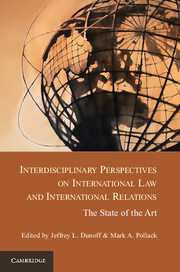 Interdisciplinary Perspectives on International Law and International Relations
Interdisciplinary Perspectives on International Law and International Relations Twenty Years Later
Published online by Cambridge University Press: 05 January 2013
Turning the pages back two decades to confront my hopes and claims as a younger scholar is an interesting and slightly scary prospect. Jeffrey Dunoff and Mark Pollack have been kind enough to refer to International Law and International Relations Theory: A Dual Agenda (Slaughter Burley 1993), as one of the “canonical” calls for interdisciplinary scholarship, alongside Kenneth Abbott's Modern International Relations Theory: A Prospectus for International Lawyers (published four years earlier, in 1989). As the proud possessor of a newly minted DPhil in international relations (IR) from Oxford, the writing of which was spent mostly at Harvard absorbing more social scientific American approaches to the discipline, and two years of law teaching, I perceived a more vibrant and interesting set of debates taking place among IR scholars than among my international law (IL) colleagues. At the same time, I knew that those debates raised many issues familiar to international lawyers. I envisioned a series of conferences that would bring together scholars from both disciplines working on common problems, as occurred in the work presented in a special symposium issue of International Organization devoted to “Legalization and World Politics” and other conferences hosted both at law schools and by political science scholars like Robert Keohane at Duke and Beth Simmons at Harvard. Indeed, perhaps the best evidence of at least the partial convergence of parts of both disciplines is that virtually all the participants in this volume know one another and one another's work.
The essays in this volume, as the editors point out, reflect multiple strands of IL/IR work. Pieces like Laurence R. Helfer's chapter on “Flexibility in International Agreements” (2013, Chapter 7, this volume) and Karen Alter's chapter on “The Multiple Roles of International Courts and Tribunals” (2013, Chapter 14, this volume) are archetypes of different kinds of interdisciplinary work. Helfer, an international lawyer with a public policy degree, takes a subject that is of interest to international lawyers, political scientists, and practicing regime designers: what degree of flexibility, with regard to withdrawal provisions, is optimal for effective international agreements? He draws on a wide range of empirical and theoretical studies by both political scientists and international lawyers to bring the disciplines together in a search for systematic answers to this basic question.
To save this book to your Kindle, first ensure [email protected] is added to your Approved Personal Document E-mail List under your Personal Document Settings on the Manage Your Content and Devices page of your Amazon account. Then enter the ‘name’ part of your Kindle email address below. Find out more about saving to your Kindle.
Note you can select to save to either the @free.kindle.com or @kindle.com variations. ‘@free.kindle.com’ emails are free but can only be saved to your device when it is connected to wi-fi. ‘@kindle.com’ emails can be delivered even when you are not connected to wi-fi, but note that service fees apply.
Find out more about the Kindle Personal Document Service.
To save content items to your account, please confirm that you agree to abide by our usage policies. If this is the first time you use this feature, you will be asked to authorise Cambridge Core to connect with your account. Find out more about saving content to Dropbox.
To save content items to your account, please confirm that you agree to abide by our usage policies. If this is the first time you use this feature, you will be asked to authorise Cambridge Core to connect with your account. Find out more about saving content to Google Drive.